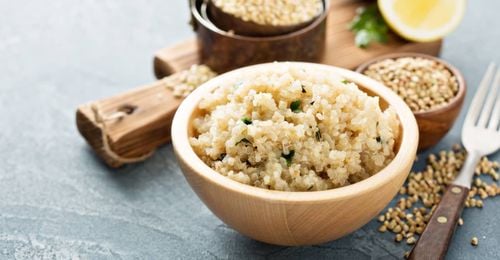The potato regimen is considered a short-term regimen promising quick weight loss. Although variations exist, the most basic version claims to help individuals lose up to 0.5 kg per day by only eating potatoes. This article will present information and evaluate the pros and cons of the potato regimen in terms of its effects on weight loss
1. Does eating potatoes help with weight loss?
Potatoes are recognized as an excellent source of nutrients, but you may wonder whether consuming potatoes can assist with weight loss or if they should be incorporated into a weight-loss diet. The rating of the potato regimen ranges from 1.08 to 5
- Overall rating: 1.08
- Weight loss: 1.0
- Healthy eating: 0.0
- Sustainability: 2.0
- Whole person health: 0.0
- Nutritional quality: 2.5
- Evidence-based: 1.0
The potato regimen typically lasts from three to five days and permits the consumption of only regular potatoes. While this diet may assist with weight loss, it is highly restrictive, as it lacks essential nutrients and could result in unhealthy eating patterns.
2. What is the potato regimen?
The widely recognized potato regimen claims to help individuals lose up to 0.5 kg daily by consuming only plain potatoes for 3-5 days. The idea of using the potato diet for weight loss dates back to 1849, but it was later popularized by author Tim Steele.
In his book, Steele asserts that potatoes are among the best regimens ever invented. He further suggests that a diet consisting solely of potatoes can strengthen the immune system, improve gut health, and provide essential nutrients to sustain energy levels while promoting weight loss. Additionally, other researchers have taken this all-potato diet to an extreme, further enhancing its popularity.
For instance, Penn Jillette's regimen, a magician, consisted solely of potatoes during the first two weeks, during which he lost 8 kg.
Although numerous individuals present evidence suggesting that an all-potato regimen has led to significant weight loss, there is currently no scientific research supporting claims regarding the benefits of potatoes in promoting weight loss.

3. The rules of the potato regimen
The all-potato regimen still lacks comprehensive guidelines for its application. However, Tim Steele outlines seven basic rules in his book:
- Rule 1: Cooked potatoes should only be consumed for three to five days.
- Rule 2: As a general guideline, consume 0.9–2.3 kg of potatoes daily.
- Rule 3: Do not consume any food other than potatoes, including seasonings and toppings such as ketchup, butter, sour cream, and cheese.
- Rule 4: Although salt may not have a significant impact on weight, it is recommended to avoid using salt when preparing meals.
- Rule 5: When feeling thirsty, it is recommended to drink only water, regular tea, or black coffee.
- Rule 6: Avoid intense physical activity. Instead, engage in light exercises and walking.
- Rule 7: Follow your doctor's instructions when taking prescription medications, but limit the use of non-prescribed supplements.
In Steele's version of the potato-only regimen, he stipulates that only white potatoes are permitted.
Other variations of the regimen are also being increasingly adopted. For instance, sweet potatoes are permitted in the Spud Fit Challenge, a popular variant of the regimen created by Andrew Taylor. In this version, herbs, spices, and minimal-fat seasonings are also allowed.
However, it is important to keep in mind that the method of preparation plays a crucial role. Fried or excessively cooked potato products, such as French fries, are unsuitable for a weight-loss regimen.
4. Can a regimen consists entirely of potatoes aid in weight loss?
Although there is no specific research on a regimen that exclusively consists of potatoes, such a regimen may contribute to weight loss due to the low-calorie content of potatoes.
Current studies indicate that a calorie-restricted regimen can result in weight loss as long as strict adherence is maintained. While consuming 0.9–2.3 kg of potatoes daily may appear excessive, it provides only 530–1,300 calories—significantly lower than the average daily caloric intake of an adult.
An interesting aspect of a reign containing potatoes is that they include a compound known as proteinase inhibitor 2, which may help alleviate hunger by slowing the digestion process.
A study involving a potato-based regimen in rats demonstrated that they consumed less food and lost more weight compared to those not following the regimen. However, the effects of a potato-based regimen have not been extensively studied in humans.
Although a regimen consisting solely of potatoes may be effective for short-term weight loss, it is not a sustainable long-term solution. While potatoes provide essential nutrients, they lack many of the nutrients required for optimal health and cannot form a balanced, healthy meal when composed solely of potatoes.
Furthermore, research has indicated that an extremely low-calorie regimen can slow metabolism and reduce muscle mass. If followed long-term, a potato-only regimen may increase the risk of weight regain upon resuming a normal regimen.
A study investigating weight loss regimens, conducted with 120,000 healthy men and women who were not obese and participated in long-term studies on regimen and health, found that participants gained an average of 1.5 kg every four years over 13 years. Following the study, researchers analyzed the foods most responsible for weight gain among these participants and found that potatoes were the primary contributor to significant weight gain: fried potatoes, potatoes, sugary drinks, red meat, and processed meat products,... Furthermore, the researchers identified additional factors contributing to weight gain, including sleeping less than six or eight hours a night, frequent alcohol consumption, and watching television.
The study results also offer methods for more effective weight loss. These include foods and lifestyle choices associated with weight loss, such as yogurt, nuts, fruits, grains, vegetables, and physical activity.
The researchers have also cautioned us about the effects of potatoes over the years and have authored a book titled 'Eating, Drinking, and Staying Healthy,' aimed at helping individuals choose a healthy eating approach.
While regular consumption of potatoes may be beneficial for active individuals or those engaged in physical labor, in specific cases, they should be consumed in moderation. For example, baked potatoes can cause a quicker and higher rise in blood sugar and insulin levels compared to an equivalent calorie intake from refined sugar.
A recent study from Willett's group at the Harvard T.H. Chan School of Public Health reinforces the notion that potatoes should be regarded as starch and categorized among foods that could potentially contribute to weight gain.

To arrange an appointment, please call HOTLINE or make your reservation directly HERE. You may also download the MyVinmec app to schedule appointments faster and manage your reservations more conveniently.








